Businesses constantly seek innovative ways to enhance their customer experience (CX). One such groundbreaking approach that has gained significant momentum is Conversational Marketing Automation.
Conversational Marketing Automation (CMA) is a marketing strategy that uses artificial intelligence (AI) to automate customer conversations. As per the ZipDo report, companies experienced a 29% increase in response rates after implementing conversational marketing strategies.
Conversational Marketing Automation represents a strategic shift from traditional, one-way marketing. It leverages advanced AI technologies like chatbots, virtual assistants, and NLP to create real-time, personalized conversations.
Salesforce predicts that by 2025, 95% of customer interaction will happen through AI. This dynamic fusion of conversational AI and marketing automation tools has led to unparalleled improvements in CX.
Continue reading to learn more about CMA and how it improves customer experience.
Marketing Automation Chatbot: The New Way to Convert Leads
Marketing automation chatbots have emerged as a powerful tool for converting leads in the digital age. These chatbots engage with potential clients, answer their queries, and assist them through the sales funnel using artificial intelligence and natural language processing.
Key Features of Marketing Automation Chatbot
Marketing Automation Chatbots are revolutionizing lead conversion strategies. Here are the key features:
Personalized Engagement
Chatbots offer tailored interactions, addressing leads by name and catering to their specific needs, enhancing engagement.
Instant Response
Marketing automation chatbots provide real-time responses. It ensures leads receive immediate information, increasing the chances of conversion.
Like BotPenguin conversational marketing automation chatbots have a response time of only 2 seconds.
24/7 Availability
Chatbots are always online, enabling round-the-clock lead nurturing. Doing this makes it convenient for prospects in different time zones.
Lead Qualification
Automation helps identify high-quality leads. It directs sales efforts toward the most promising prospects.
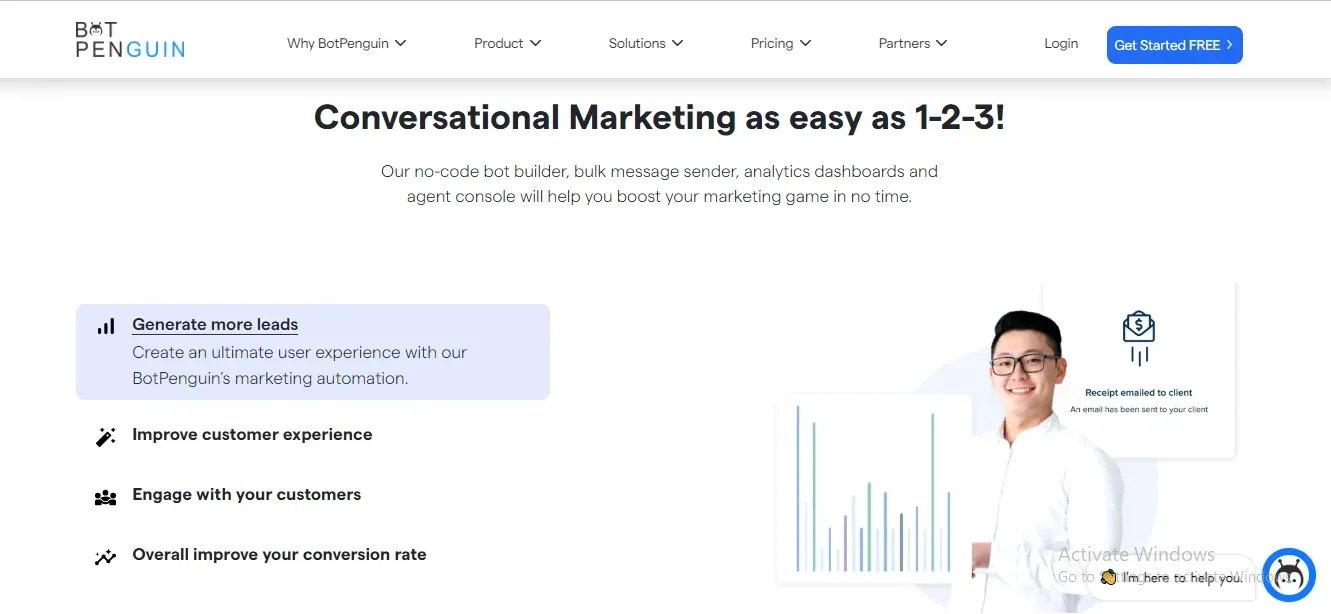
Seamless Integration
Chatbots seamlessly integrate with CRMs and marketing tools, streamlining lead data management.
Data Insights
Conversational marketing automation chatbots gather valuable data on lead behavior. It allows for more effective targeting and personalized content.
Cost-Efficiency
Conversational marketing automation chatbots help in automating repetitive tasks. It reduces operational costs, maximizing ROI.
Scalability
These chatbots quickly scale lead conversion efforts as your business grows, maintaining efficiency.
Along with Marketing Automation, BotPenguin has other features too;
- Marketing Automation
- WhatsApp Automation
- Customer Support
- Lead Generation
- Facebook Automation
- Appointment Booking
What is Conversational Marketing Automation?
Conversational Marketing Automation uses automated tools to facilitate real-time, personalized conversations with website visitors, leads, and customers.
At its core, CMA involves seamlessly integrating chatbots, natural language processing (NLP), and AI algorithms. These components work together to understand customer queries, provide relevant information, and handle transactions.
From Traditional Marketing to Conversational Marketing
CMA represents a paradigm shift in marketing. It's no longer about bombarding customers with generic messages; it's about having meaningful conversations.
By adopting CMA, businesses can build trust, foster relationships, and create memorable experiences that keep customers returning for more.
How Can Chatbots Enhance Marketing Automation and AI?
Now that we understand the power of chatbots and the essence of CMA let's explore how they enhance marketing automation and AI.
Supercharging Marketing Automation
Chatbots take marketing automation to a whole new level. They can handle repetitive tasks, such as lead qualification, nurturing, and scheduling appointments.
It frees up valuable time for marketers to focus on strategic initiatives and creative campaigns.
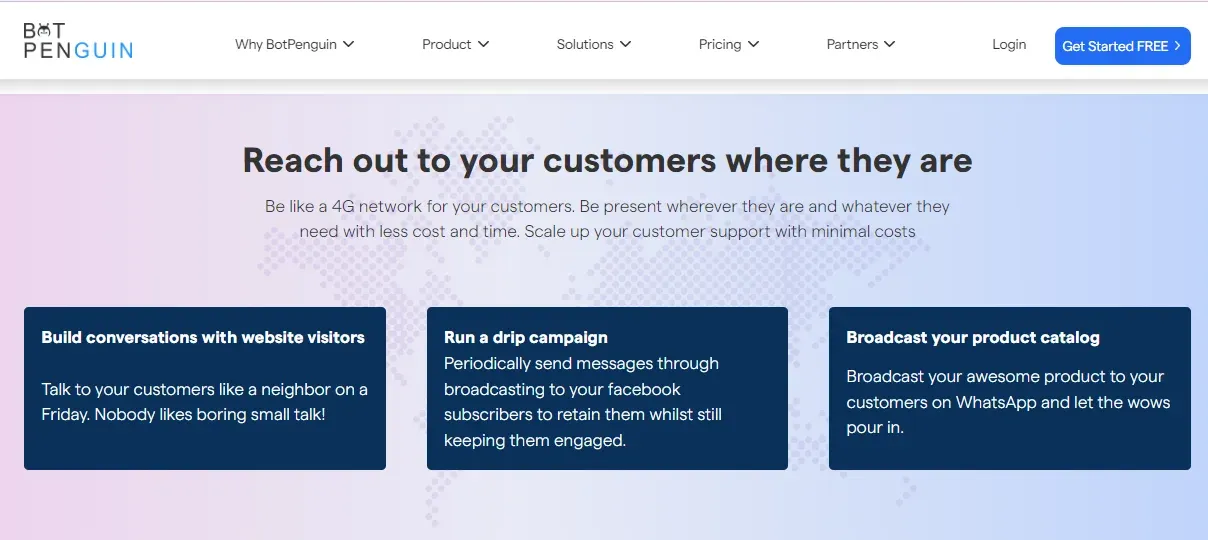
Artificial Intelligence
Behind every successful chatbot lies the power of AI. AI algorithms enable chatbots to learn from customer interactions, adapt to their preferences, and continuously improve their responses.
The Perfect Blend: Chatbots and AI
When chatbots and AI join forces, they create a dynamic duo that can deliver exceptional customer experiences. Chatbots provide the interface and conversational capabilities, while AI algorithms power the intelligence and personalization.
Why is Conversational Marketing Automation Important for Better CX?
Conversational Marketing Automation (CMA) can bring personalized service to the digital world and revolutionize customer experience (CX). So let's see about that:
Enhancing Customer Engagement and Satisfaction
Customers expect instant responses and personalized interactions. CMA allows businesses to engage with customers in real time. It provides immediate assistance and tailored experiences.
By offering a conversational interface, businesses can create a human-like interaction that keeps customers engaged and satisfied.
Real-Time Interactions and Instant Responses
Gone are the days of waiting for hours or even days to get a response from a customer support team. The Salesforce report states that 71% of customers want organizations to connect with a conversational marketing bot in actual time.
With CMA, businesses can provide instant responses to customer queries 24/7.
It can answer product questions, provide support, and guide customers through buying. BotPenguin chatbots powered by CMA can handle it all in real time.
Personalization and Tailored Experiences
Customers want to feel unique and valued. CMA enables businesses to deliver personalized experiences by analyzing customer data, preferences, and behavior.
Chatbots can offer tailored recommendations, product suggestions, and even personalized offers by understanding each customer's unique needs.
24/7 Availability
Unlike human agents, automated conversational marketing tools can be available 24/7. It ensures customers can get assistance or information anytime, regardless of time zones or working hours.
Doing this caters to the needs of modern customers who expect instant responses and round-the-clock support.
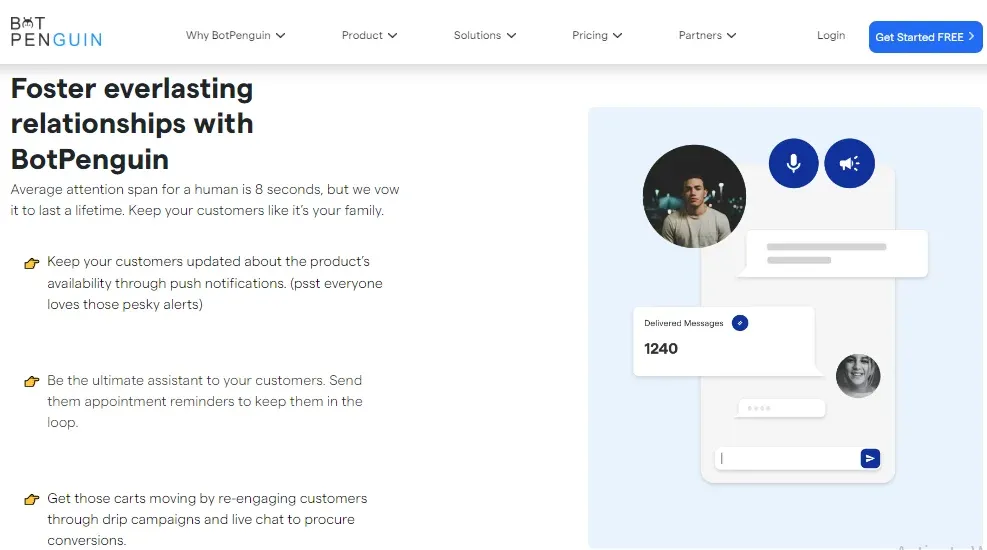
Scalability
As businesses grow, handling customer inquiries and interactions manually becomes challenging.
Conversational marketing automation can handle a high volume of interactions simultaneously. It ensures that every customer gets a timely response.
This scalability is crucial for maintaining a high level of CX as your business expands.
Consistency
Automated conversational marketing tools provide a consistent customer experience. They deliver the same level of service and information every time. It eliminates the variability that can occur with human agents. This level of consistency builds trust and reliability with customers.
Data-driven Insights
Conversational marketing automation tools collect and analyze data from customer interactions. This data can provide valuable insights and data into customer behavior, preferences, pain points, and frequently asked issues.
This information allows businesses to improve their customer experience plans, product offers, and marketing initiatives.
Cost-Efficiency
While providing real-time engagement and personalized experiences, conversational marketing automation can also be cost-effective.
It reduces the need for a large customer support team and can handle routine inquiries. Doing this allows human agents to focus on more complex and high-value tasks.
Lead Generation and Conversion
Conversational marketing automation can proactively engage website visitors and qualify them as leads. It also guides them through the sales funnel.
It can help identify potential customers ready to purchase and assist in the conversion process. Doing this will boost revenue and improve CX by simplifying the buying journey.
Multichannel Support
Customers interact with businesses through various channels. It includes websites, social media, email, and messaging apps.
Conversational marketing automation can be integrated across these channels. It provides customers with a seamless and unified experience regardless of how they engage.
How Does Conversational Marketing Automation Work?
Now that we understand CMA's importance, let's dive into how it works.
The CMA Process Unveiled
At the heart of CMA lies the chatbot, the virtual assistant that interacts with customers. To comprehend and respond to client inquiries, chatbots use natural language processing (NLP).
AI algorithms power the chatbots, enabling them to learn from customer interactions. It can adapt to their preferences and continuously improve their responses.
Key Components of CMA
CMA relies on several key components to deliver exceptional customer experiences:
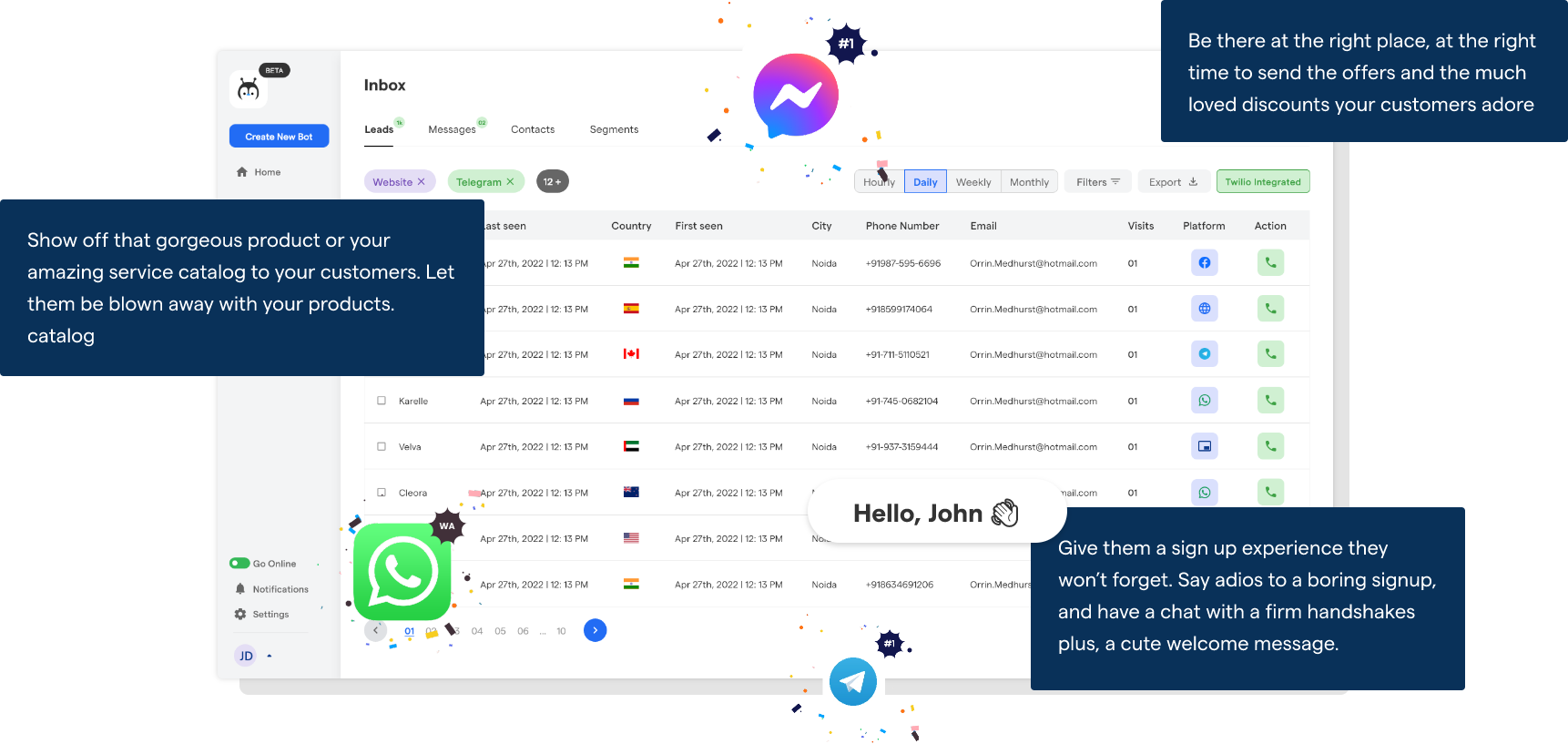
Chatbots and Virtual Assistants
Chatbots are the pillar of CMA. They are the interface through which customers interact with businesses. These virtual assistants can handle various tasks, from answering FAQs to processing transactions.
Chatbots' conversational abilities create a seamless and engaging experience for customers.
Natural Language Processing (NLP)
NLP is the leading technology that enables chatbots to understand and interpret human language. Chatbots can analyze customer queries, extract meaning, and provide relevant responses.
NLP algorithms are trained to recognize patterns, understand context, and even detect sentiment. It ensures that chatbots can engage in natural and meaningful conversations.
Machine Learning and AI Algorithms
Machine learning and AI algorithms power the intelligence behind chatbots. These algorithms enable chatbots to learn from customer interactions, adapt to their preferences, and improve their responses.
By continuously analyzing data and feedback, chatbots become more intelligent and capable of delivering personalized experiences.
Who Can Benefit from Conversational Marketing Automation?
In this section, we'll see who can benefit from conversational marketing automation.
E-commerce Businesses
For e-commerce businesses, CMA can be a game-changer. Chatbots can assist customers in finding products, provide personalized recommendations, and even handle transactions.
By offering a seamless and interactive shopping experience, e-commerce businesses can boost conversions and customer satisfaction.
Service-Based Industries
Service-based industries like healthcare, hospitality, and financial services can leverage CMA to enhance customer support and engagement.
Chatbots can provide instant assistance, answer common questions, and schedule appointments. Service-based businesses can improve efficiency and deliver a superior CX by streamlining customer interactions.
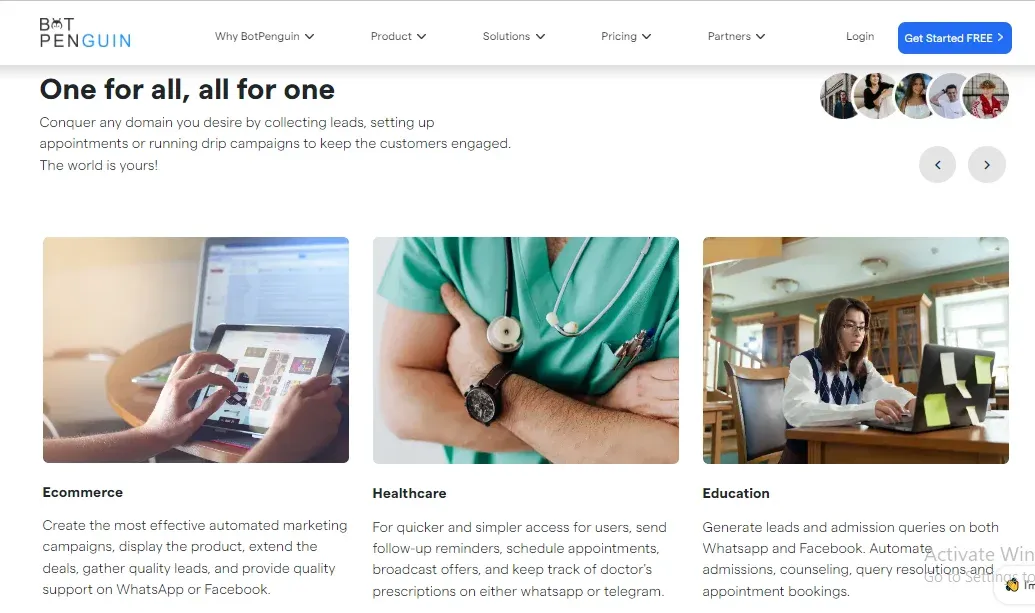
B2B and B2C Companies
Companies in the B2B and B2C sectors can both profit from CMA. B2B companies can use chatbots to qualify leads, provide product information, and offer personalized solutions.
B2C companies can leverage chatbots for customer support, order tracking, and personalized recommendations.
CMA enables businesses to engage with customers at every stage of the buyer's journey, from lead generation to post-purchase support.
Startups and Small Businesses
Small firms and startups frequently have few resources and employees. CMA can level the playing field by automating repetitive tasks, providing instant support, and delivering personalized experiences.
With CMA, startups and small businesses can compete with more significant players and create a memorable CX that sets them apart.
When Should You Implement Conversational Marketing Automation?
In this section, we'll go through to know when is the best time to implement Conversational marketing automation.
Launching a New Product or Service
When introducing a new product or service, generating buzz and engaging potential customers is crucial. CMA can play a vital role in this process.
By implementing chatbots and automated messaging, you can provide instant information, answer queries, and guide users through purchasing. This real-time interaction can create a personalized experience and increase the chances of conversion.
Scaling Customer Support
As your business grows, so does the demand for customer support. Conversational marketing automation can help you scale your support operations efficiently.
Chatbots can handle a sizable volume of client questions by automating repetitive processes and giving prompt responses. It frees up your support team to focus on more complex issues. It also ensures a faster and more efficient resolution for customers.
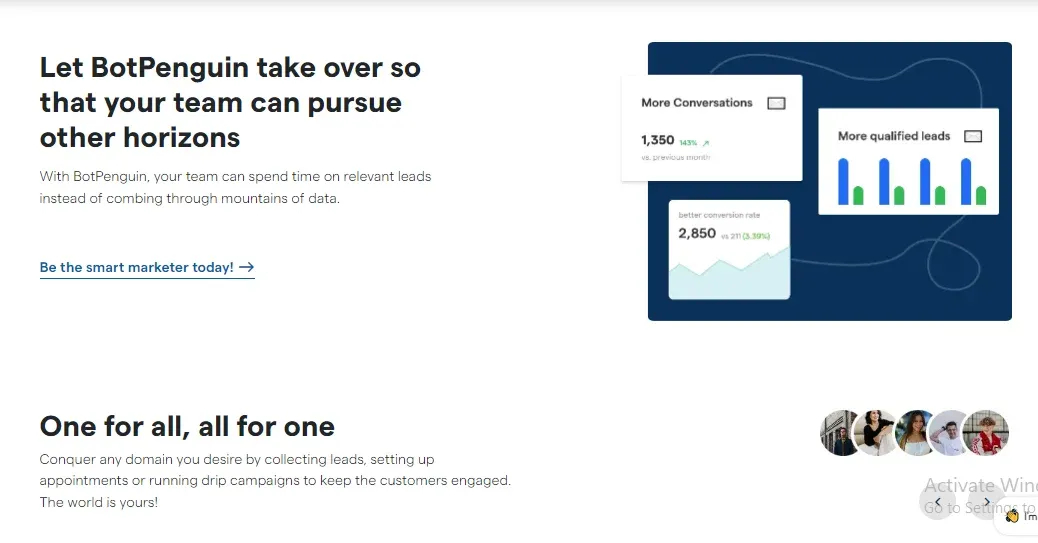
Improving Lead Generation and Qualification
Conversational marketing automation can revolutionize your lead generation efforts.
You can converse with visitors in real time by integrating chatbots on your website or social media platforms. Further, it can capture their information and qualify leads based on their responses.
This automated lead qualification process saves time and resources. It lets your sales team focus on high-quality leads and close deals faster.
Challenges and Considerations
There are many challenges and considerations in implementing conversational marketing automation. So let's see that:
Integration with Existing Systems
Integrating conversational marketing automation with your existing systems, such as CRM or marketing automation platforms, can be complex.
It's crucial to ensure seamless data flow and synchronization between different tools to provide a unified customer experience.
Consider working with a knowledgeable IT team or consulting experts to ensure a smooth integration process.
Maintaining a Human Touch
While chatbots and automated messaging are efficient, balancing automation and human interaction is essential.
Customers still value personalized experiences and human touch. Incorporating options for live chat or providing clear avenues for customers to reach a human representative. It can help maintain a positive customer experience.
Privacy and Data Security
Conversational marketing automation involves collecting and storing customer data. It's essential to prioritize privacy and data security to build customer trust.
Implement robust security measures, comply with data protection regulations, and communicate your data handling practices to customers.
Best Practices for Implementing Conversational Marketing Automation
In this section, we'll go through the best practices for implementing Conversational marketing automation.
Define Clear Objectives
Before diving into CMA, it's essential to define clear objectives. What do you hope to achieve with conversational marketing automation?
Whether improving customer engagement, increasing conversions, or streamlining support, having a clear vision will guide your implementation strategy.
Understand Your Audience
It's critical to comprehend your target audience in order to develop engaging chatbot conversations.
Conduct in-depth research to determine their communication preferences, pain points, and preferences. It will help you tailor your conversational marketing automation to meet their needs.
Design Conversations with a Human Touch
While chatbots are automated, designing conversations that feel human is vital.
Use a conversational tone, inject personality, and add a touch of humor when appropriate. It will create a more engaging and enjoyable experience for your customers.
Provide Clear and Concise Information
When designing chatbot interactions, make sure to provide clear and concise information. Avoid long responses that may confuse users.
Break down information into digestible chunks and use bullet points or numbered lists when appropriate.
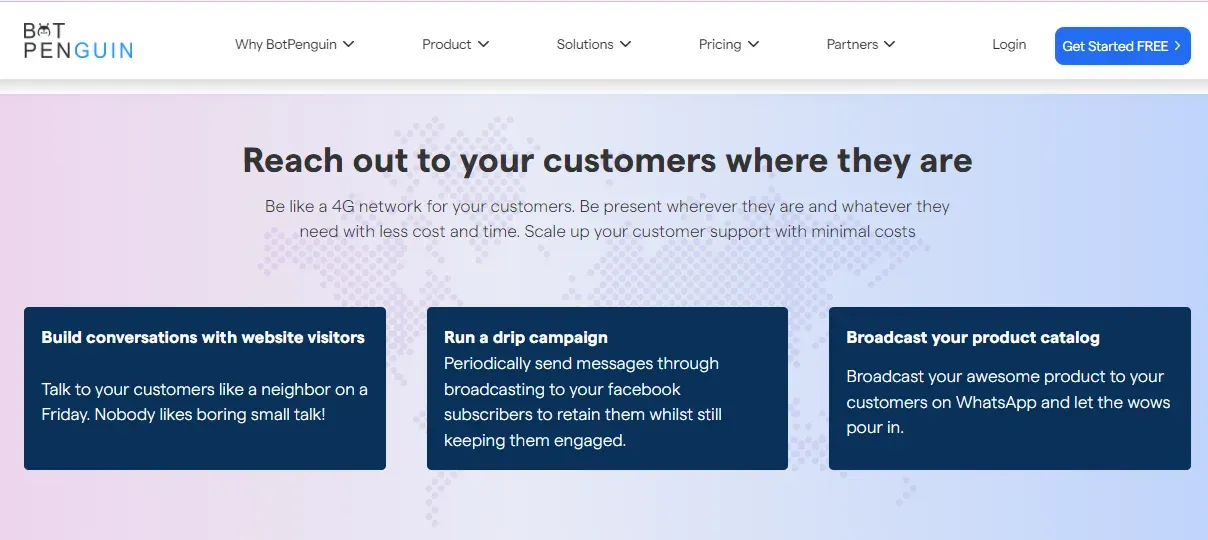
Test and Iterate
Implementing CMA is an iterative process. Test and refine your chatbot interactions based on user feedback and data analysis.
Regularly monitor performance metrics and make necessary adjustments to optimize the customer experience.
Integrate with Existing Systems
To maximize the benefits of CMA, integrate it with your existing systems, such as CRM or marketing automation platforms.
It will enable seamless data flow and synchronization. Doing this provides a unified customer experience across different touchpoints.
Conclusion
In conclusion, conversational marketing automation (CMA) is a powerful tool that can significantly enhance businesses' customer experience (CX).
Businesses can use chatbots and automated messaging to communicate with their customers in real-time. They can also provide instant information and guide them through the purchasing journey.
We discussed the benefits of CMA in terms of lead conversion, scaling customer support, improving lead generation, and integrating with existing systems. We also highlighted the challenges like maintaining a human touch, privacy, data security, and the need for clear objectives.
BotPenguin is an AI chatbot platform that uses conversational marketing automation to help businesses improve their customer experience. BotPenguin chatbots assist in engaging with customers in a more personalized and efficient way. BotPenguin chatbots can fit businesses of all sizes and industries to increase their lead generation and improve sales.
As technology advances, conversational marketing automation will play an increasingly important role in delivering exceptional customer experiences.
So, consider implementing conversational marketing automation to enhance your CX and take your marketing efforts to the next level.
Frequently Asked Questions (FAQs)
How does conversational marketing automation improve customer experience?
Conversational marketing automation improves customer experience by providing instant responses, personalized interactions, and real-time engagement.
Can conversational marketing automation be integrated with existing systems?
Conversational marketing automation can be integrated with existing CRM or marketing automation platforms.
What are the challenges in implementing conversational marketing automation?
Implementing conversational marketing automation challenges include integrating with existing systems, maintaining a human touch, and ensuring privacy and data security.
What are the best practices for implementing conversational marketing automation?
Best practices for implementing conversational marketing automation include:
- Defining clear objectives.
- Understanding your audience.
- Designing conversations with a human touch.
- Continuously testing and refining interactions.
How can conversational marketing automation enhance customer engagement?
Conversational marketing automation enhances customer engagement by providing instant responses, personalized recommendations, and guiding customers through the buyer's journey.


